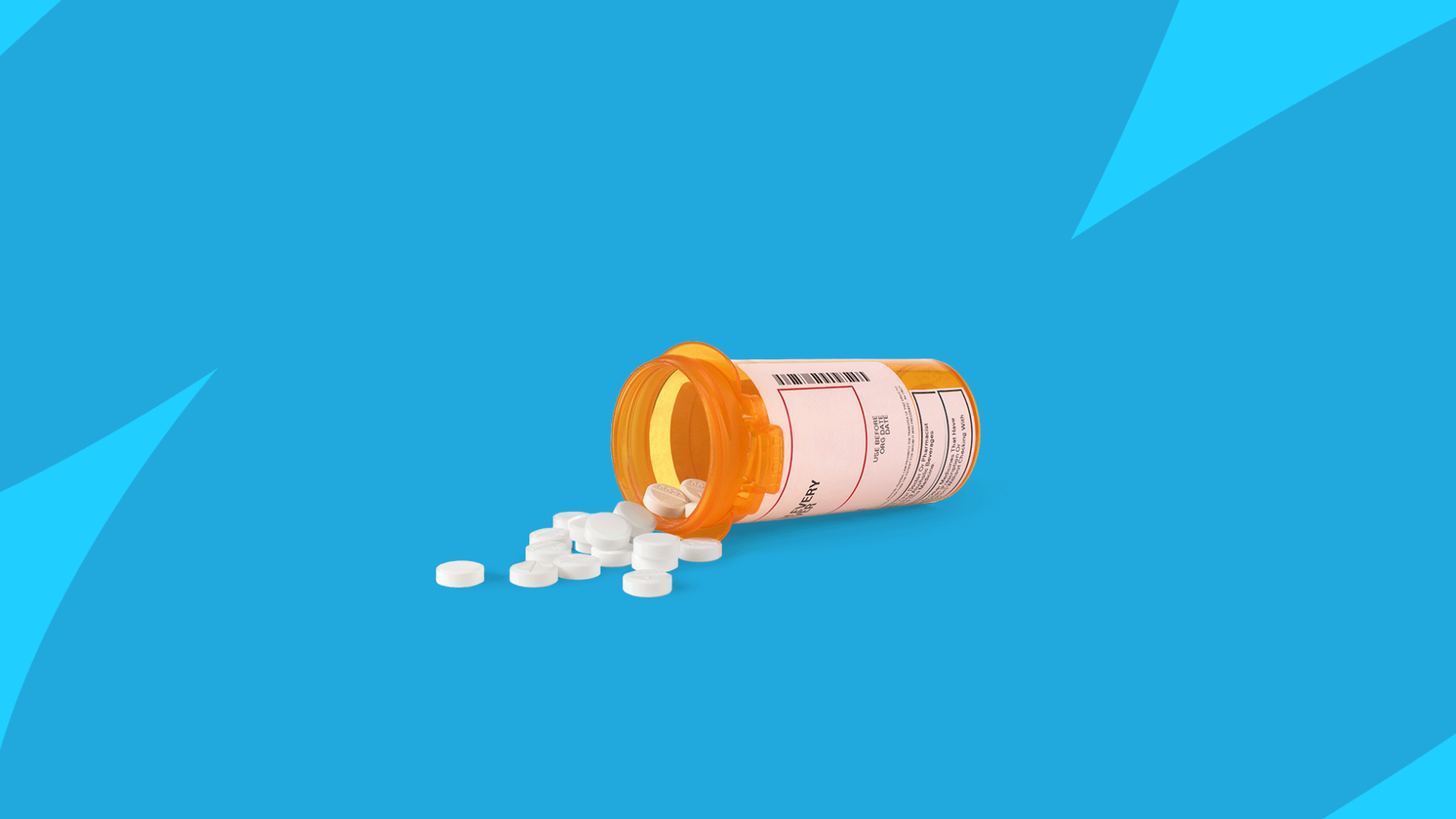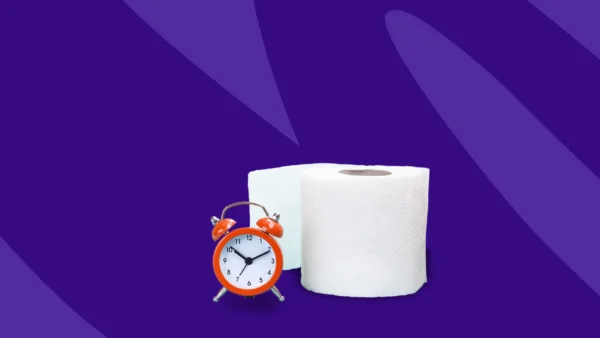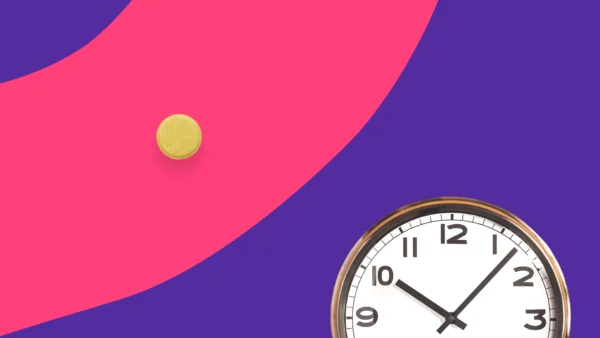Cyclobenzaprine is a prescription muscle relaxant that is approved by the U.S. Food and Drug Administration (FDA). It’s usually dispensed in pharmacies as a generic medicine, but healthcare providers commonly refer to it by brand names Flexeril (immediate-release tablets), Fexmid (immediate-release tablets), or Amrix (extended-release capsules). Flexeril is no longer made in the U.S. as a brand-name drug. Cyclobenzaprine is used for a short period of time, along with rest and physical therapy, to relieve muscle spasms associated with acute, painful musculoskeletal conditions.
While taking cyclobenzaprine, it is important to be aware of interactions and warnings so you can stay as safe as possible. Continue reading to learn more about how to take cyclobenzaprine safely and avoid interactions.
Key takeaways:
- Some of the most notable cyclobenzaprine interactions include alcohol, drugs that increase serotonin levels, MAO inhibitors, CNS depressants, and drugs that lower the seizure threshold.
- Cyclobenzaprine interactions can often result in serotonin syndrome, or they can cause more serious side effects of cyclobenzaprine, such as extreme sedation, slowed breathing, or impairment.
- In the event of a cyclobenzaprine interaction, such as serotonin syndrome or CNS depression, seek medical help.
Cyclobenzaprine drug interactions
Cyclobenzaprine can interact with various prescription and over-the-counter (OTC) medications, to varying degrees of severity. Before you take cyclobenzaprine, tell your healthcare provider about all the medications you take including prescription drugs, OTC medicines, vitamins, and supplements. Check with your healthcare provider before starting any new medications while taking cyclobenzaprine.
Drugs that can cause serotonin syndrome when combined with cyclobenzaprine
Serotonin syndrome is a life-threatening condition caused by the buildup of serotonin. This can happen when you take more than one medication that increases serotonin level, or if you take too high a dosage of a medicine that increases serotonin. Signs and symptoms of serotonin syndrome range from mild (such as agitation, anxiety, or diarrhea) to life-threatening (such as a high fever, seizures, irregular heartbeat, and unconsciousness). If you have any of these symptoms, seek emergency medical care.
While taking cyclobenzaprine, you may need to avoid the medications below or be carefully monitored if you need to take both medications. Or, your healthcare provider may decide to prescribe a different drug than cyclobenzaprine. Examples of drugs that can cause serotonin syndrome when combined with cyclobenzaprine include, but are not limited to:
- Selective serotonin reuptake inhibitor (SSRI) antidepressants used for depression or anxiety such as Lexapro (escitalopram), Paxil (paroxetine), Zoloft (sertraline), or Prozac (fluoxetine)
- Serotonin-norepinephrine reuptake inhibitor (SNRI) antidepressants such as Cymbalta (duloxetine) or Effexor (venlafaxine)
- Tricyclic antidepressants such as Elavil (amitriptyline) or Pamelor (nortriptyline)
- Monoamine oxidase inhibitors (MAOIs) such as phenelzine or tranylcypromine
- Opioid pain medications such as Ultram (tramadol), OxyContin (oxycodone), or Demerol (meperidine)
- Wellbutrin (bupropion)
- Triptans for migraine such as Imitrex (sumatriptan) or Maxalt (rizatriptan)
- St. John’s wort
- Verapamil
Monoamine oxidase inhibitors (MAOIs)
We mentioned MAOIs briefly in the above section as a class of medications that can cause serotonin syndrome when taken with cyclobenzaprine. Additionally, the prescribing information indicates that an MAOI drug should never be taken while taking cyclobenzaprine or within 14 days of the last dose of cyclobenzaprine. The combination could cause high fever, seizures, or even death. If you take an MAOI, your healthcare provider will not prescribe cyclobenzaprine. You can ask about an alternative medication that will be safer to take with an MAOI, or ask if there is an alternative to the MAOI. Examples of MAOIs include:
- Azilect (rasagiline)
- Emsam (selegiline)
- Marplan (isocarboxazid)
- Nardil (phenelzine)
- Parnate (tranylcypromine)
- Zyvox (linezolid)
Central nervous system (CNS) depressants
CNS depressants cause a slowing down of the central nervous system. Cyclobenzaprine is a CNS depressant. Taking it with another CNS depressant should be avoided because it can worsen the adverse effects and cause impairment and extreme sedation. In some cases, it can cause slowed breathing, coma, or even death. Make sure you tell your healthcare provider if you take a CNS depressant, or ask your doctor or pharmacist if you are not sure if any of your medications are CNS depressants. Your healthcare provider may decide to recommend a lower dose of cyclobenzaprine—or prescribe a different drug altogether.
In addition to muscle relaxants, other examples of CNS depressants include:
- Drugs for anxiety (benzodiazepines) such as Xanax (alprazolam) or Valium (diazepam)
- Drugs that help with sleeping such as Ambien (zolpidem)
- Barbiturates such as phenobarbital
- Opioid pain medications such as Vicodin (hydrocodone/acetaminophen) or oxycodone
- Older antihistamines like Benadryl (diphenhydramine)
Medications that lower the seizure threshold
Cyclobenzaprine is chemically similar to tricyclic antidepressants. These drugs are known to lower the seizure threshold, making you more likely to have a seizure, and should be used with caution in people who have seizures. Talk to your healthcare provider if you have a history of seizures, and make sure your doctor knows about all the medications you take. If there is a possibility of a drug interaction, your healthcare provider may prescribe a different medication. Other drugs that can lower the seizure threshold include:
- Bupropion, including drugs that contain bupropion such as Auvelity (bupropion/dextromethorphan)
- Tramadol, including drugs that contain tramadol such as Ultracet (tramadol/acetaminophen)
- Tricyclic antidepressants
Other cyclobenzaprine interactions
In addition to drug-drug interactions, it’s always important to know if your medication interacts with certain foods, drinks, supplements, or medical conditions. Although cyclobenzaprine does not have any notable food interactions, there are some other interactions and precautions to be aware of.
Cyclobenzaprine and alcohol
Alcohol is a CNS depressant, like cyclobenzaprine. Combining alcohol with cyclobenzaprine can result in the complications described above such as impairment and extreme sedation—and in some cases, it can cause slowed breathing, coma, or even death. Avoid alcohol while taking cyclobenzaprine. If you do drink alcohol, talk to your healthcare provider. They may recommend a different medication.
Cyclobenzaprine and dietary supplements
St. John’s wort is a dietary supplement used for depression. It increases serotonin levels, and should not be combined with cyclobenzaprine because the combination could cause serotonin syndrome. The same type of interaction is possible with the supplement SAMe, a supplement that is used for depression. If you take a supplement that causes drowsiness such as valerian or kava, check with your healthcare professional before combining it with cyclobenzaprine.
Cyclobenzaprine and cannabis
While taking cyclobenzaprine, avoid cannabis or CBD. The combination with cyclobenzaprine could cause additive CNS depressant effects.
Cyclobenzaprine and illicit drugs
Cyclobenzaprine should not be taken along with illicit drugs like cocaine, because it can increase the risk of serotonin syndrome or other complications.
Cyclobenzaprine and certain health conditions
Before taking cyclobenzaprine, tell your physician about all of your medical conditions and medical history as well as family history. Cyclobenzaprine is not safe for everyone. You should not take this medication if you:
- Are allergic to cyclobenzaprine or any ingredient in the medication
- Currently, take an MAOI (wait at least 14 days after stopping an MAOI before taking cyclobenzaprine
- Have recently had a heart attack
- Have certain heart or heart rhythm conditions such as heart block or congestive heart failure
- Have an overactive thyroid (hyperthyroidism)
Cyclobenzaprine may be prescribed with caution and close monitoring in individuals with certain medical conditions, such as liver disease, glaucoma, or bladder problems.
If you are pregnant or breastfeeding, consult your healthcare provider for professional medical advice.
Cyclobenzaprine and older adults
The American Geriatrics Society’s Criteria for potentially inappropriate medication use in older adults outlines medications that may not be safe for older adults (generally 65 years or older). Cyclobenzaprine is on the list because it can cause troublesome side effects such as dry mouth, constipation, drowsiness, dizziness (which can increase the risk of fractures due to falls), and confusion. Experts note that cyclobenzaprine is poorly tolerated by older adults due to these side effects and that the lower doses prescribed for older adults are not always effective. Talk with your doctor for professional medical advice.
How to minimize cyclobenzaprine interactions
Here are some tips to minimize the risk of cyclobenzaprine interactions:
- Before taking cyclobenzaprine, make sure your doctor knows your full medical history and all of the medications you take, so they can screen for drug interactions or other potential problems. While taking cyclobenzaprine, do not start any new medications unless approved by your doctor. Keep an updated list of your medications with you.
- Cyclobenzaprine often causes drowsiness. Do not drive or operate machinery until you know how cyclobenzaprine affects you.
- Avoid alcohol while taking cyclobenzaprine. If you drink alcohol, talk to your doctor about an alternative medication.
- Know the possible warning signs of interactions, like serotonin syndrome or CNS depression, as described above. Get emergency medical help for these symptoms. You should also get emergency medical help if you have any symptoms of an allergic reaction, such as hives, trouble breathing, or swelling of the face, lips, tongue, or throat.
When to talk to a healthcare provider about cyclobenzaprine interactions
Because there are so many potential cyclobenzaprine interactions, this article does not provide a complete list. It is important to communicate with your healthcare provider about all of your medical conditions and the medications you take. This will help minimize the risk of interactions and ensure proper management and monitoring.
Sources
- Cyclobenzaprine hydrochloride tablet, film-coated, National Library of Medicine DailyMed
- Cyclobenzaprine, National Library of Medicine MedlinePlus
- Cyclobenzaprine hydrochloride drug summary. Prescribers’ Digital Reference
- Cyclobenzaprine tablets, Cleveland Clinic
- American Geriatrics Society 2023 updated AGS Beers Criteria® for potentially inappropriate medication use in older adults, Journal of the American Geriatrics Society
- Cyclobenzaprine, StatPearls











